#Which is only emphasised by the fact that this is the point he LOSES.
Text
Just saying, a lot of Edelgard's White Clouds interactions with TWSITD are a hell of a lot more forgivable when you remember its not just an Emperor and the devil she made a deal with, it's also a deeply traumatised teenager forcing herself to continue to interact with her abusers because she's trying to convince herself that her suffering at their hands meant something.
(with a side of a very clearly displayed implication that they won't hurt her while she's useful to them-)
#Like. That is the one thing I don't like about Hopes so far#It should've been Hubert suggesting the plan#And Edelgard fretting about the risks#Would've given both a chance for a rare scene of emotional vulnerability between those two#AND a lot more weight and stuff to work with for Edelgards guilt in Monica's supports#Cause. As is her guilt mostly feels like a 'haha she rescued Monica here but YOU know a timeline where she didn't don't you player?'#Which sucks because if it were handled better it could've been an amazing exploration of both thier characters#Instead of the (admittedly funny) Monica simping hours we got-#But yeah I will argue to my dying breath that taking down Cornelia is Edelgard's most important character development on CF#And it's the reason we don't need to see her take down the entirety of the Slithers#THAT is the moment Thales illusion of control over her conpletely shatters#Which is only emphasised by the fact that this is the point he LOSES.#We know from the other routes that the second he fired those javelins his days are numbered#And here he did it as little more than a power play- a futile attempt to remind El of his control#fe3h#fire emblem 3 houses#fire emblem three houses#edelgard von hresvelg#edelgard discourse#edelgard positive
22 notes
·
View notes
Text
you and choi seungcheol have been playing a game since the start of the summer.
it sort of went unspoken; lingering gazes and lopsided smirks instead of words. cat-and-mouse; who’s going to cave? who’s going to give in? who’s going to lose?
it was fun, at first. entertaining, even, sneaking out with him at night, speeding down your small town roads in his car, going absolutely nowhere. sneaking back in, muffling your giggles and waving him off from your window so he knows you’re inside okay.
ice-cream, sticky fingers, sandals on hot pavement; firework shows, drive-in movies, mall shopping. and through it all, undeniable tension lacing your every interaction with him. the feeling’s addictive — you could get drunk on it, the way the very air seems to crackle when the two of you are together.
the thing about addiction is that the highs don’t last long.
your sister calls it a situationship; your best friend calls it a pain in the fucking ass; your other friends call it a fear of commitment form both sides.
whatever it is, it’s starting to eat you alive, and you think you might just be the one to lose. not to cave, because you’re not stupid enough to actually confess to choi seungcheol; but you’re stupid enough to feel the need to.
especially on nights like tonight, where he rolls the windows down, lets the wind blow through his hair, sends you soft smiles every few minutes. seungcheol always has music playing in his car, you’ve noticed, but then, he’s been like that since you guys were in high school, three, four years ago. seventeen year old seungcheol was always getting in trouble with the teachers for having headphones in, among other things.
you were the opposite. invisible — quiet, one of those pleasure to have in class students. seungcheol was more than visible, he was noticeable. everyone noticed him.
“remember when you flipped all the chairs in mr daniels’ classroom, back in school?” you ask suddenly, breaking the silence.
a slightly smirk tilts his lips. “i didn’t know you knew about that.”
you scoff. “please. everyone knew about that.”
“he was an asshole,” seungcheol shrugs, instead of denying it. “he had it coming.”
“some might say you were an asshole back then,” you counter, and he whips his head to face you for a moment, before turning back to the road.
“who would say that?” seungcheol demands, but you can tell by his tone that he’s only joking, and he knows you’re joking too. “surely not you,” he adds. “we never even spoke in high school.”
which is true. your worlds hadn’t collided until well after high school — until last summer, when you were both twenty, through a friend of a friend of a friend, or something of the sort. now, you’re twenty-one, and he’s sneaking you out your parents’ house practically every night just for “a drive”.
these drives are slowly becoming self-destructive, because you’re falling deeper and deeper into him. he’s a flame and you’re the moth, running straight towards him blindly — and getting shocked when you get burnt.
“yeah, but i at least knew who you were back then!” you retort immediately, pulling yourself back to the present conversations.
“i knew you too!” seungcheol defends indignantly, his jaw dropping slightly.
“sure, cheollie,” you snort, patting his free hand.
he grabs your hand in his, interlacing your fingers, and you have to remind yourself to breathe, he’s just doing it to emphasise a point, this isn’t real, this isn’t more. “i did!” he insists. “we had the same english class. you sat in the second row from the back, right beside the window, and you had a clear pencil case and pastel highlighters, and at lunch you sat with your friends under the tree by the basketball court, and you had this ring” — he taps one of your favourite rings — “on almost all the time. and back in freshman year, you were nominated for class president and you turned it down. every time you had to introduce yourself and say a fun fact, you’d say your name and your favourite colour.”
you’re speechless, and seungcheol is enjoying it. “i told you,” he says cockily. “i did know you.”
“i stand corrected,” you say finally, breathing in deeply, thanking the stars above that he’s just pulled into your street, and you can freak out about this later. because everything about him — his earnest brown eyes, those stupid, beautiful dimples — makes you want to scream.
and you’re so lost in repressing this scream that you don’t realise he’s stopped the car opposite your house, and is looking at you in concern. “___?” he questions. “are you okay?”
you force a smile, already unbuckling and opening the door. “i’m fine! don’t worry!”
the next day, you get absolutely wasted.
you’re out without seungcheol, for once; with old friends from high school and newer friends from college, which is an odd mix, but once everyone’s downed a few shots, it doesn’t really matter.
you’re downing more than a few — fuelled mostly by the thoughts of a certain brown-eyed, dark-haired boy, which keep seeping into your mind; a never-ending stream of oh, he likes this whiskey!, and ahh, he loves this song! and a billion other things that remind you of him. ironic, that you go out to drink, cancel on him and his plans, in order to forget him, but all you can think about is him. you see him in everything; you miss him when he’s not near; and you come to the drunken conclusion that you’re falling a little too far into a summer fling, and you don’t know how to stop yourself.
and when it’s time to leave, your friends don’t quite know what to do with you. all you can whine about, against the judgement of that small sober corner of your mind, is cheollie, i miss him~, janeese, can you call him for me? and janeese, bless her patient soul, does exactly that.
he comes quickly. he always does when you call. but usually, you’re not drunk off your ass outside a bar — usually, you don’t greet him with a delighted gasp and a squeal (“you came! i knew you’d come for me!”). but he catches you when you fling yourself against him, steadies you and smiles against your shoulder. “hey, pretty,” seungcheol says, in that smooth, soothing voice of his, lips against your ear in a way that makes even your drunken self stir a little. “let’s get you home, yeah?”
you don’t say much of anything coherent until he’s trying to buckle you in the car, at which point you lift your drooping eyes and stare at his figure leaning over you. “you’re so handsome it makes me angry,” you accuse suddenly, brows furrowing in a way that makes seungcheol laugh — surprised, but endeared, as he tugs on a strand of your hair and pulls away.
“thank you,” he pronounces, with a mock bow, before shutting your car door and getting in on the other side.
he’s barely left the street when you start crying.
he doesn’t notice at first, only when you start sniffling — at which point his head whips towards you: “holy sh— baby, are you crying?”
“yes!” you wail, rubbing at your eyes furiously. his eyes are flicking rapidly between you and the road, one hand reaching out to grasp yours.
“what’s wrong? what happened?”
“you happened!” you choke through a dramatic sob, pushing his hand away. “you’re so mean. you’re mean to me, seungcheol.”
“mean— what did i do?” seungcheol’s worries features pull into a frown, and he rakes a hand through his hair. “tell me, baby, i’ll fix it. i swear.”
“that, for starters! the baby thing!” you declares, waving your hand with a grimace. “you make me all mushy inside and that’s mean — and you ask me if i’m fine and i say yes and i’m lying, by the way, so i guess i’m mean too — and you’re so pretty and — i don’t know! is this a game? am i a game?”
seungcheol had started pulling over halfway through your speech, and now he turns to face you properly, hands reaching towards you, and then faltering — he starts saying something, something brilliant and comforting and sweet, you’re sure, but you’re already cutting him off in your drunken fervour.
“i think,” and you hiccup here, sniffing weakly and turning away from him, “i think i might start loving you soon, and i just — i thought — maybe you could like me back, even a little, you know.”
this time, seungcheol does reach out for you, cupping your face, turning your face towards him slowly. “i do, baby,” he says softly, “more than a little, okay? much more.”
you lean against his tender touch with a weak sniffle and pitiful eyes gazing at him. “a lottle?”
a smile curves his lips. “yeah,” he agrees gently. “i like you a lottle.” he pauses, thumbing away your tears with delicate touches. “so don’t cry, okay? i don’t like seeing you sad — and,” he adds suddenly, like he’s just remembered, “i don’t like it when you call me seungcheol, okay?”
“that’s your name,” you say weakly. “what else do i call you?”
“cheol,” he suggests, “cheollie. baby.” he pauses, looks at you for a moment. “boyfriend.”
“okay, boyfriend,” you say, giggling suddenly. “take me home.”

an / this is requested by an anon as part of my 1k celebration event! prompt was the song cruel summer by taylor swift <3
perm taglist: @n4mj00nvq @eoieopda @som1ig @glowunderthemoon @wondering-out-loud @graybaeismytae @hannyoontify @sahazzy @dokyeomin (send an ask to be added!)
#seungcheol fluff#seungcheol comfort#seungcheol x reader#seventeen fluff#seventeen fic#seventeen x reader#seventeen imagines#seventeen fanfic#seungcheol imagines#choi seungcheol#seungcheol angst#seungcheol fanfic#scoups fluff
734 notes
·
View notes
Text
An overlay of games
Two injured arms? What are you trying to tell us, Fujimoto ?
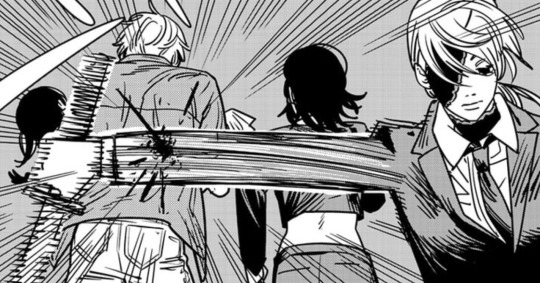

The interesting thing about the first part of the chapter is this page in which Denji hesitantly answers. It's another way of accentuating his existential crisis, even when he's called an impostor, Denji can't defend his position firmly and confidently.
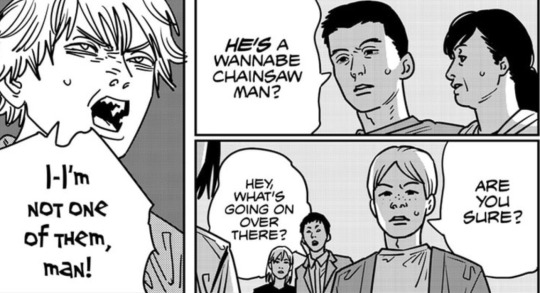
It's normal, he's still bound by the dilemma of the public hunters who have forbidden him to reveal and be Chainsaw Man himself, and above all he's competing with the impostor for his own identity.
Denji isn't THAT scandalized by being pointed out as a wannabe CSM because he is one now, he's been so robbed of his identity that he's almost willing to become himself.
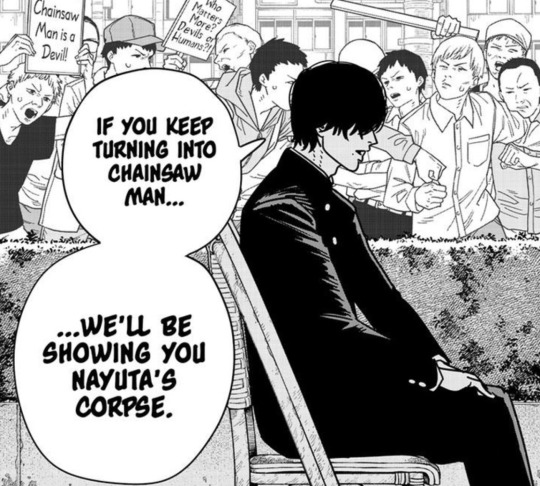
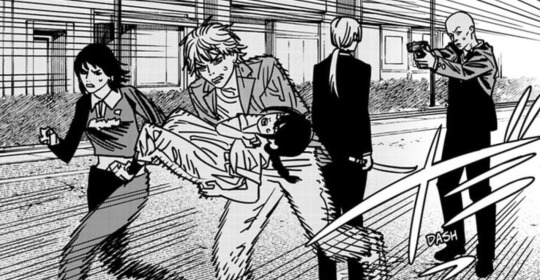
This chapter also hints at the fact that the public hunters don't agree on everything, probably because of a hierarchy or unity game. For example, some hunters only thought that the church was having fun playing CSM, not knowing that it was fighting against the prophecy of Nostradamus.
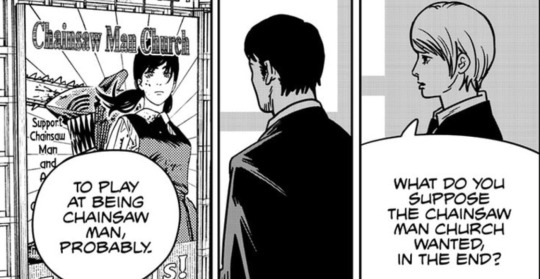

However, this information was gathered by Yoshida through his interview with Fami, but it remained highly confidential. Here again, this public hunter doesn't know that Denji is CSM. In short, information isn't leaking out of the Special Division 7.
Yoshida is the mediator between the public hunters and Denji, but also with the church with Fami. Katana, Quanxi and the possessed man with the dripping brain are the henchmen. Fumiko is the one in charge of preventing any temptation on Denji's part to get closer to the church.
But there's something else that I find even more interesting that follows this point. If we try to untangle everyone's role. We end up with Yoshida; Quanxi; Katana; the possessed one with the overflowing brain; Fumiko; Denji and on the other, on the church side, we have Fami, Barem, Miri, the weapon of the whip, the bow and finally Asa. That's six against six.

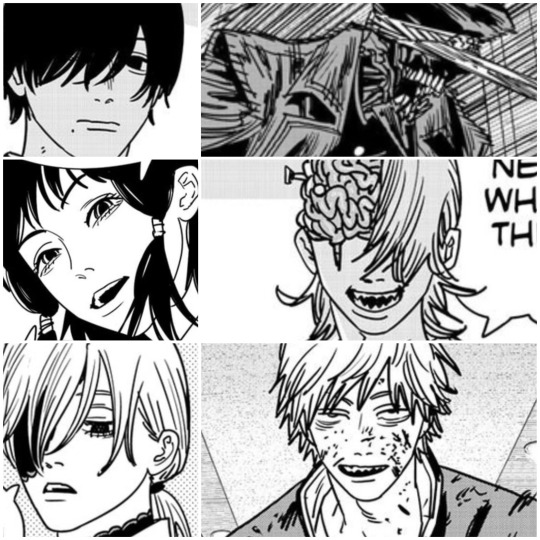
Asa's room is 606. And as I've explained several times, Fujimoto tends to play with numbers in this part 2. So I'm going to try and give you an explanation.

When I saw that not only Quanxi had her arm bruised but Yoshida had sliced Asa's arm, the first thing I thought was "a tie". On one side we have Quanxi losing her arm to protect while on the other we have Yoshida attacking with a slice. The fact remains that an arm has been lost on each side, so there's a certain balance.
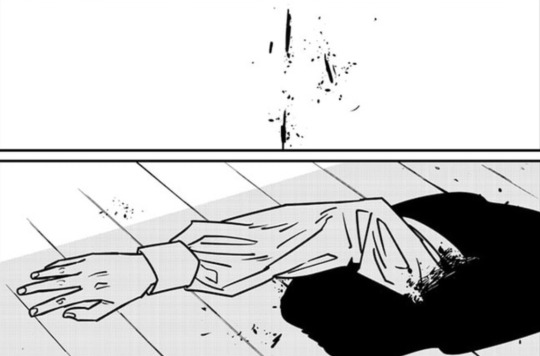
Let me remind you that there are six against six in this game, and nobody has won any points yet, which makes 0.
6 0 6, ball in the middle.
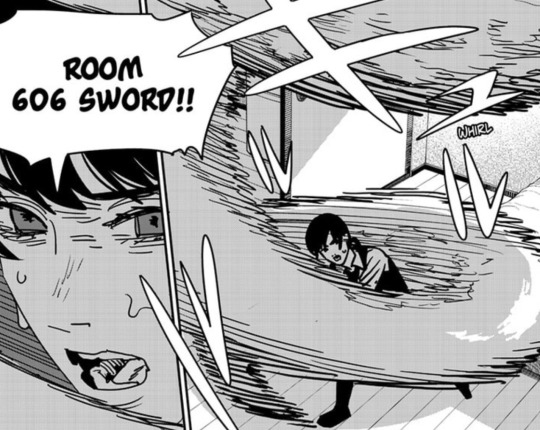
I sincerely believe that what Fujimoto is setting up is a form of game, a war in which we're going to have to keep score.
Barem is called Barem BRIDGE, a card game of 2. against 2. This time it's not just a game about the clan war but the whole manga: Fami and Barem on one side, the demon of Death and maybe Fake! CSM on the other
Did you know that one of the players called himself the dead man? ;))))))
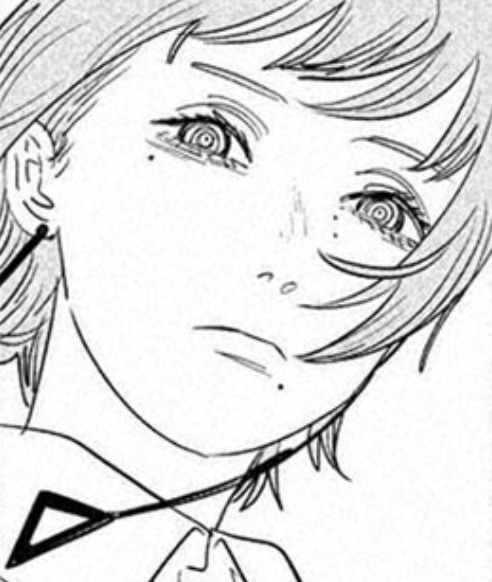
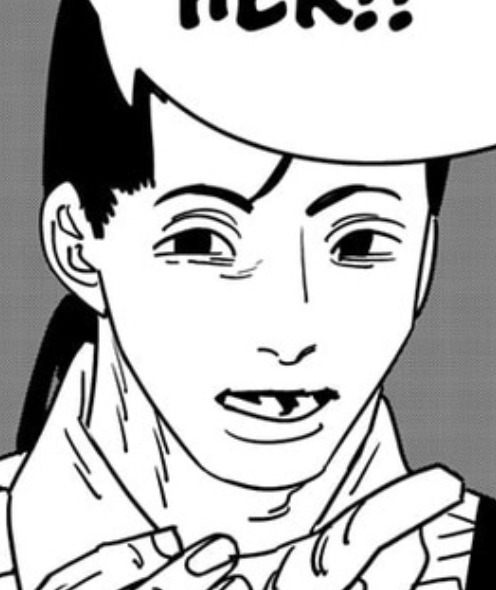
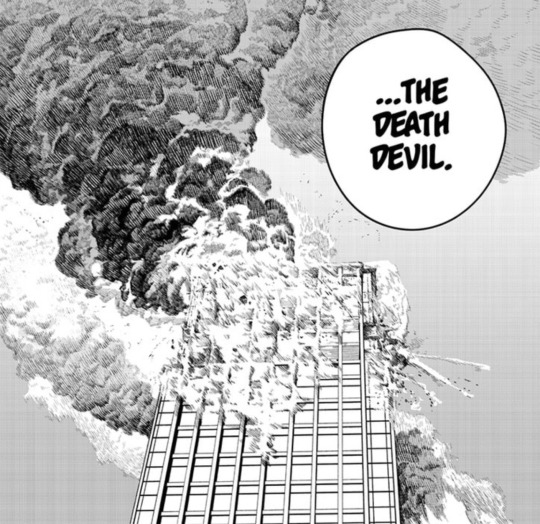

I think the human usurper and fake!CSM are two different entities because the demon has twice interfered with Fami's plan by eliminating the fire demon (Yuko) and saving Denji and Asa.


But it doesn't stop there, so let me come back to a few bridge rules (I don't know how to play, so if I'm wrong, please correct me).
The game opens with the "contract", i.e. declarer commits to making a given number of tricks. Just like the beginning of the game in CSM started with Barem announcing his contract with the fire demon.
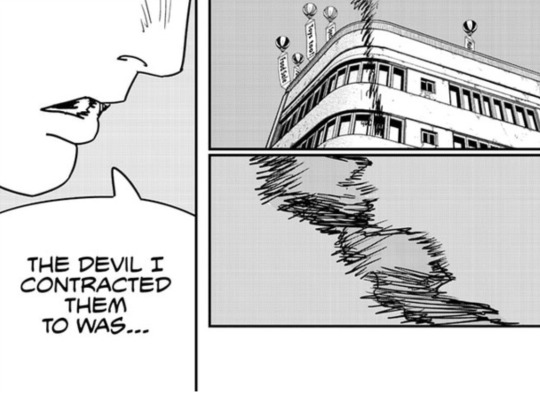

A game of bridge is played in several moves, each move corresponding to a deal. Each player holds 13 cards, which they have arranged in a row to form what is known as their "deck" or "hand". Again, this is not to say that game 2 works exactly like bridge (and its horribly complex rules) but rather to emphasise the symbolism.
Every time one of the sides moves, an injury occurs, a limb is neutralised or even pulverised.


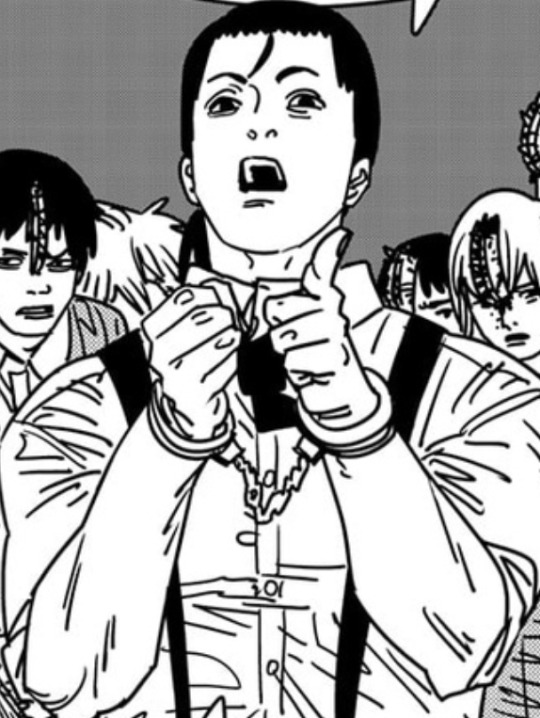

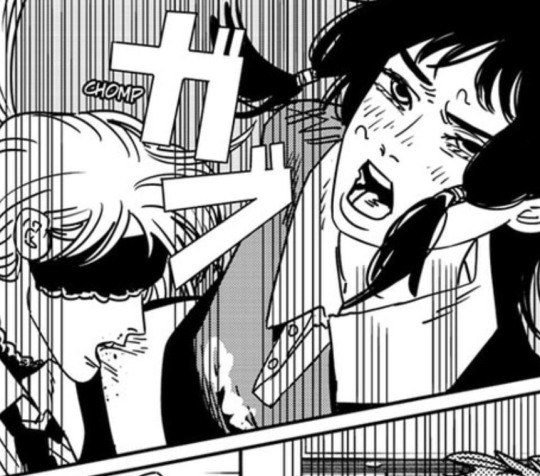
I wanted to end this analysis with the "strong" part of the chapter, Yoru's return in force. I was stuck on the symbolism of the arm, its symbolism in art and its relationship to war.
So much so that I forgot to read the line: Yoru is a team player, she speaks as "we".
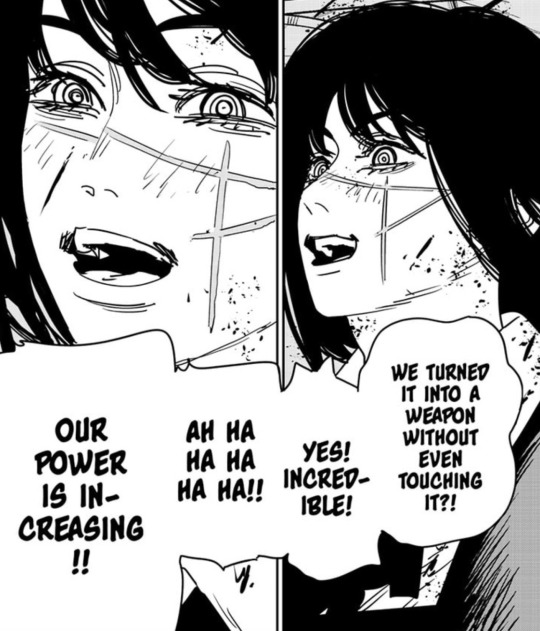
And then everything fell into place.
There's a contrast between Yoru's exaltation and the fact that she's still missing a member.
But everything makes sense with this fusion introduced by the "we".
Yoru is missing nothing, not even an arm, and Asa has become the perfect continuity of her being and her limbs.
Asa may have transformed her flat, her home, but she hasn't lost her bearings, because each of these girls has become the home of the other.

While Denji denies the duality of his being, Asa is embracing it.
While Yoru, even without her arm, feels her strength reaching its peak thanks to her completeness with Asa.
Now, don't you think that making room 606 a weapon whose number symbolizes the status quo is just the beginning of hostilities?
To be obsessed with victory, even if it means leaving your mark, isn't that the definition of waging war?

Or is it just playing a card game ?
#chainsaw man#csm#csm part 2#csm spoilers#csm 148#csm 147#csm 146#csm 143#csm 142#csm 133#csm 128#csm 111#denji hayakawa#nayuta hayakawa#my thoughts#asa mitaka#barem bridge#yoshida hirofumi#fami#death devil#katana man#quanxi#fumiko mifune#Yuko#yoru
314 notes
·
View notes
Text
that being said, my actual biggest issue w/ the bnha ending is Deku being a quirkless hero with an armoured All Might-esque supersuit.
now heres the thing, I don't hate Deku ending the story as quirkless. I, like loads of other people, assumed from fairly early on assumed that bnha would end either with Deku going back to being quirkless or, if not that, back to not having any of the OFA vestiges' quirks and just having that 'base' OFA super strength/speed, with which he could still continue being a pro hero
the thing is, I had always assumed that if bnha did go down the 'Deku loses OFA entirely and goes back to being quirkless' route then as a result of that, the whole 'this is the story of how I became the greatest hero' thing from the beginning of the story would take on a new light. the reveal would be that we, the audience, already saw Deku become the greatest hero over the course of the 2 wars and defeating AFO/Shigaraki, and/or that he would become the 'greatest hero' but not the kind hero that the audience assumed, instead working as a quirkless teacher/villain outreach worker/quirk analyist/hero assiant/etc.
and that would be pretty poignant endind would it not? a re-emphasising of this idea that its not just the pros who are heroes, but that everybody in society who 'reaches out' and works to make the world a better place is a hero too, regardless of how 'strong' they may or may not be, that it was never truly about having a powerful quirk and being a pro superhero, but by stopping those who want to do harm, and saving people, that's what truly made Deku the greatest hero
and like bnha's finale did kinda do that a bit with Deku being a heroics teacher at UA for eight years but then it, in my opinion, ruined that by having Deku become a quirkless-with-a-supersuit pro hero.
the thing is, if Deku couldve been a quirkless pro hero this whole time, then there was no reason for All Might to even give him OFA, and for the story as a whole, to happen. and I'm sure some people will counter that point by saying like 'oh but the suit cost LOADS of money' or 'but they were only able to make the suit after analysing the data from All Might's fight with AFO', but to me that just further proves why Deku getting a supersuit so he can be a quirkless pro hero is dumb.
All Might is the no.1 hero in Japan and is globally renowned, if he wanted to secure the funding to make Deku some kind of supersuit he couldve done that right when he met Deku as a quirkless middle schooler, but he didn't. in fact, when explicitly asked by Deku if he could become a hero, even without a quirk, All Might told him that being a quirkless pro hero was impossible. he didn't say that to be cruel or because he's fantasy-ableist or whatever, he said that because he genuinely believed it to be the truth, and he was right.
the fact that support items are not replacements for quirks and actual hero-ing skill/talent is established fairly early on. All Might mentions, some time around the sports festival if I remember correctly, that he's seen heroes who are overly reliant on their support items become useless/a liability once those items break. its a nice and tidy in-universe justification for why every hero isnt walking around with robot armour and ray guns and what have you. and okay, sure, bnha's finale is set eight years in the future, it could be reasonable to assume that in that time, plus with all the funding provided by class 1-a and All Might, that the support industry has really developed and Deku's supersuit is some absolute top of the line technology.
even then, there's still a glaring issue. we saw the exact scenario All Might described play out, WITH All Might. his supersuit was technological marvel, it let him get some genuine damage in on the most powerful villain ever, but ultimately it broke, and without it All Might was unable to fight, and became a liability that had to be rescued. and I'm not saying that to trash on All Might or anything, that is literally just how that quirkless-hero-with-a-supersuit scenario worked out for him.
and okay, sure, you could argue that Deku's supersuit, developed in the eight years since the war, using the data from that fight, and likely with even more money put into it, is a lot better than All Might's supersuit was, and also that it took AFO to wreck All Might's supersuit and its unlikely that there'll ever be a villain that powerful ever again so Deku doesn't have to worry about his own suit in the same way. and sure, you could even argue that non-quirkless pro heroes still have times when they're unable to use their quirks for one reason or another, and just have to rely on their own strength/skills/etc the same way Deku would if his supersuit broke or malfunctioned
but even with all that, my problem is is that it was established, multiple times, why it wasnt a viable option for Deku to just be a quirkless pro hero who used support items, and if the narrative wants to roll that back and go, no, wait, it is actually a totally viable option, then it just begs the question of why don't all pro heroes have supersuits, why is Deku the first quirkless person to become a pro hero in this way, and why, if this was an option, did the story even have to bother with Deku inhereting OFA and learning to make it his own power?
i get what they're going for here, having Deku be a quirkless pro hero with a supersuit is trying to play into the whole 'it was never the power, but rather who midoriya izuku is as a person, that makes him a great hero' but if you ask me its just such a cheap and deus ex machina-y way of doing it???
i genuinely think Deku either being quirkless and instead working in some other way that helps people and/or helps pro heroes help people OR keeping OFA (minus the vestiges' quirks) and going on to a pro hero, and in either scenario, having a moment with All Might and/or Bakugou where they emphasise to him that he is, and always was, a hero, regardless of a quirk, would just be infinitely more narratively coherent and satisfying
the bnha ending isnt terrible, and im certainly not saying people can't like it or trying to drag them if they do, but i am say that me, personally, i dont like it all that much, AND i think its bad writing
#boku no hero academia#my hero academia#bnha#mha#izuku midoriya#og post //#i have. MANY issues. with bnha's ending. but this is deffo the part that bugs me the most#its just. imo. such a major disservice to deku's character#nothing will ever dissapoint me re; failed and unutilised narrative potential as much as SAO tho so im basically immune#naruto. homestuck. erased. jujutsu kaisen. sometimes shit just has mid-ass endings
32 notes
·
View notes
Text
Thoughts about the Banshees of Inisherin in no particular order because I'm insane and I spent at least a third of the screening with tears streaming down my face
Padraic starting out the film happy and one by one realising how few things he was relying on to stay that way, just the dreadful hit after hit as he loses his friend, his sister, his donkey and even the village idiot he couldn't get to leave him alone
Something which reminds me of the most painful moments of catcher in the rye or lord of the rings - having a protagonist who does not suffer stoically, does not repress his emotions until a breaking point, but laments and begs for help and reaches out again and again and is broken by the pain inflicted upon him and is not strong enough to survive through it
The most horrible sight to behold in our culture - a grown man crying
In general that whole scene. Padraic standing up to the shithole cop, getting assaulted, Colm wordlessly helping him up but refusing to comfort him once he broke down or stay with him past the crossing
Jenny being buried in padraic's blanket
The hooked stick.
The second confession scene containing both "kind of weird, but strictly speaking not a sin" and "you got me there"
"and what about the despair?" "It's back a bit" "but you're not going to do anything about it, are you?" "No, I'm not"
I wish I knew enough about Irish or English history to say something more about the civil war's significance to the story but I can at least say the faraway conflict gives an eerily absurd tone to Padraic and Colm's feud, like they are simultaneously squabbling over nothing and waging some great existential battle
Speaking of which I was absolutely astounded to see a genuine discussion about the meaning of life in like the first ten minutes of this film. Padraic represents my own belief that a life spent enjoying yourself and making others happy is well lived and valuable, while Colm is obsessed with being remembered and believes his life will only have been worthwhile if he does something remarkable, if he leaves something behind. I kind of wanted Padraic to ask him what it matters to him how someone will feel about him long after he's dead in the ground, but regardless this was a genuinely compelling and shockingly well laid out philosophical conflict
In general I'm stunned by how seamlessly and plainly the themes are interwoven with the story. It's hard to put into words exactly but it's some damn good scriptwriting
I called this movie a masterpiece of small scale tragedy on letterboxd and I fully stand by this. This microscopic in the grand scale of things drama - made to look even smaller by the fact that it's two grown men having it - is simultaneously shown very clearly to encompass padraic's entire world. The tiny island setting is used wonderfully to emphasise this
Speaking of which, I have a massive soft spot for stories where the location is a character unto itself, or in any case has a huge role to play. This is a perfect example of a story like that
And speaking of the tragedy genre, this is maybe the best example I have ever seen of comedy and tragedy/drama woven together completely seamlessly? I can't think of a single moment where the tone shift felt jarring or the mood felt inappropriate. One of the moments I remember most clearly as integrating humour with drama is when Siobhan sees the first finger and padraic's comically stunned reaction combines with her comically realistic one to create a genuine air of tragedy somehow. It's also a good example of the similarly seamless weaving together of naturalistic and stylised storytelling
Not only the horror of loving someone who hates you, but of having that person leverage your love for them in order to keep you away
In general, most heartbreaking film I think I've literally ever watched. 10/10 masterpiece probably will not watch again all the way through because it's too painful
555 notes
·
View notes
Note
orpheus and eurydice vs wolfstar?? i NEED to hear your thoughts!!! (as a classics nerd marauders fan i can't believe i didn't think to draw parallels between ships n mythology sooner)
Reblogs, this ask and an ask from @transwolfstar has officially convinced me.
I've always gone back and forth on who was who in this scenario, but I've come to the conclusion recently.
Orpheus is Remus, Sirius is Euridyce 100%.
Orpheus is what I believe Remus would have been if he hadn't been attacked by Greyback. He grew up loved, and as sheltered as he physically could have been from the world until he went to school. Orpheus was one to see the best in the world, what the world could become. He was a loner through and through, which is so Remus coded tbh. Remus is connected and grounded, which I fully believe Orpheus was, based on the way he used his musical talents.
Euridyce being Sirius is something I'm so genuinely passionate about. He sees the world for what it is because he's been through such extreme hardships. Euridyce and Sirius are kindred spirits through and through. Not only that, but in the original myth Euridyce was a nymph. The way Sirius' beauty is so heavily emphasised throughout his mentions in the books and films (to the point that I lowkey love the being part veela headcanon) is so Euridyce.
This leads me on to THEIR LOVE. Orpheus falls head over heels for Euridyce, but not just because she's a minor deity, because of her. Because she's his soulmate, his everything, the person he's willing to literally go to the end of the earth for. This is so fucking paralleled by Wolfstar. They love each other so genuinely unconditionally (according to all canon that I read too much into and a lot of fanon), and Remus is willing to fight, even kill an old friend, with very little real confirmation/context, at the drop of a hat for Sirius.
Remus loses Sirius for the first time tragically in the same way Orpheus loses Euridyce (on their wedding night). For both, it isn't permanent, in spite of the fact that they believe it will be. Euridyce is in the underworld, which is known to be a genuinely traumatising afterlife that causes you to lose all sense of identity, and Sirius is in Azkaban, which feeds on your positive memories and forces you to lose all sense of self.
Orpheus seeks out and cares for Euridyce so deeply, using his skill set (his music) to save her from the underworld. This is a bit of a stretch, so you can completely disregard this one, but Remus is a more subdued character (because he grew up in more hardship than Orpheus, moulding his character into a more reserved one), making his staying with, looking out for and understanding Sirius without words his own variation of this.
All of the waiting; both Orpheus and Remus knowing that every second in their own respective torture was stripping them of their soul, their identity. Then, when they're finally reunited, they get no time together. Orpheus has to lead Euridyce, walking for days, without looking back, without ever knowing if she was really following him, if the gods had tricked him, if she had been taken or hurt at all on the way back. Remus and Sirius are immediately thrown back into a war, with no way to keep one another safe. Every day was one of uncertainty, and they had Harry, the child of their dead best friends, to look out for every single step of the way.
They both end in tragedy.
Orpheus, when he's out of the final stretch, the cave, turns. He looks for Euridyce. Whether it's on instinct, because she trips, because he believes he's been tricked, or because he could hear her crying the entire time and finally reached his limit, he turns around. He loves her so much that he searches for her, and he loses her because of it. Remus, however, allows Sirius to walk into the trap. He hears the panic, he knows that Sirius will go straight after Harry, will walk straight into the trap on his own, and brings the Order. He tries to keep Sirius safe. His problem is one of looking away. Of being so caught up in the war, that he can't even register what is happening until it's over. Until Sirius has been taken from him, even though he did everything he did to keep him safe. For both of them, it looks like they're going to make it, that everything is going to be okay, until it isn't. One painfully human moment, and they're both gone. Orpheus because he doesn't trust his circumstances and looks back, Remus because he trusts them too much and looks away.
Still, there was never an ounce of blame appointed to Orpheus or to Remus. The poem Metamorphoses by Ovid puts it perfectly. “Eurydice, dying now a second time, uttered no complaint against her husband. What was there to complain of, but that she had been loved?”
Sirius is taken through the veil. Remus doesn't know if he is truly in the afterlife, or if he's trapped in between, suffering helplessly and wishing for relief. Wishing that he could take it all back, or that he could just die. He can't even go after him and find him. He has to hold Harry back, hold him together. Orpheus doesn't know how long it will take Euridyce to lose her mind in the afterlife. For everything that he fell in love with to be stripped away, for her to become nothing but a being of eternal suffering. He attempts to use his music to get back to the afterlife, but he cannot.
Orpheus is eventually killed, as is Remus. Both too soon, both not soon enough.
Right person, not enough time.
It's absolutely heartbreaking, and it's what I spend my every waking moment thinking about.
#THEYRE JUST SO#thank you for validating my delusions today xoxo#wolfstar#remus lupin#marauders#sirius black#young marauders#atyd marauders#james potter#peter pettigrew#remus x sirius#dorcas meadowes
32 notes
·
View notes
Text
Choas Energie vs Prism Energy.
Heyo! I've been in a funk for some time and feeling stilted. So why not do something different and just air out some ideas and thoughts I have about Sonic Prime? I've always wanted to do a deep dive or write some fun headcanons but never found the courage to do it. After agonising about it for some time, I realised that this is Tumbr, and I have nothing to lose by posting my thoughts here.
One, I fucking love the idea of Choas Energy being the reason why Shadow cannot enter the gates except for Ghost Hill. Ghost Hill still has traces of Sonic and Shadow's old world, a graveyard with roaming phantoms spouting the same rhetoric over and over again. With nowhere to escape the grey haze, it is not surprising Shadow preferred the Void over the hollow husk of Green Hill. (And well, to make sure he was able to catch Sonic and drag him down from his adventure to face the music of his actions)
Throughout the series Choas has been something revered, ancient and mysterious. The mugful of the Sonic Universe gathers the seven mystical elements and defeats the bad guy of the game kind of shenanigans. The very idea that it works against one of the most powerful wielders of said energy is pure irony. Especially since the one who goes Super is allowed to go through these worlds.
Beyond this point, there will be spoilers for the last season of the show; please do not continue if you still have to finish it.
Sonic was the last part of Paradox Prism; of course, as long as he ran fast enough, he could break the boundaries of the world. The Prism energy negated the Choas Energy. But not without a price. Without Nine's tech, Sonic was unstable (Sonic's subtle need for Tails shines through, which is only natural as that is his little buddy! I am so glad the series emphasised Sonic's unwavering trust in Tails, which transfers to Nine. Like his best friend becoming his worst enemy is such good grub. I was fed by the tail end of the series. Pun intended)
One contender is that because of the nature of the incident, Sonic cannot control his running. It is as if he is in a constant state of stop, go, stop, go because the energy inside him keeps reliving the same action over and over again—a loop, if you will.
Or, and this is more fantasy than fact, the Prism and Phaos energy inside of Sonic were clashing with each other and making it impossible to get anywhere without zipping all over the place. Perhaps if it had gone on for too long, Sonic's body would have taken a toll from the constant stress his body is in. I mean, we did not see Sonic eat or sleep in the show (which I suppose makes sense as the show barely had time to focus on such mundane things. Nine drank a juice box, though, which good for them), so I am only guessing that Nine's invention and his determination is what kept him upright. That and time distortion, which is canon! But a detail that is easily forgotten among the more exciting things.
But more about that later, finishing my thought about Choas Energy. the last bits of Choas left are Sonic, Shadow, and the Choas Emerald Shadow accidentally dropped in the Void (it appeared back in Shadow's hand in the final after Green Hill was restored, but I wonder what that means for the Shatterverse if everything has been set back to its 'original state'). It is only natural since the Paradox Prism used Mobuis as its template to create the other worlds (and so also Sonic's pals and Doctor Eggman, Big was also splintered, so that means close proximity to the Prism was not needed to become split. What a shame we did not see any other characters from the cast Cream and Cheese or the Choatix). It would use its own energy to replace the missing Choas Energy.
After all, the shards act like emeralds in the sense that they supply endless power. However, their capabilities lay in manipulating their surroundings rather than Choas, which amplifies the power inherent to the user. (Only the Choas Council used their shard like a battery, which is unsurprisingly uncreative of them) I am not a Sonic veteran, and I am probably wrong about this, but the Choas Emeralds do not seem to react to just about anyone. Maybe it is because we only saw it interact with the important characters of the show rather than the background characters, but Prism Energy seems to be more responsive than Choas. Maybe because the changes were made so recently? Or is it in the Prism's nature to be so easily manipulated? Neither do the shards of the crystal have a master emerald to soothe them or act like an anchor. It is all quite interesting. There are so many holes in the Shatterverse. Without Sonic interfering, I am sure the whole Shattverse would have collapsed in on itself, as its nature is to be unstable. None of the characters are balanced because they are born from splinters. They become their own people eventually, but it is in their nature to be unsatisfied and seek what makes them whole.
The last fun headcanon I have is that Choas is corrosive to the worlds the Prism created. For example, when Shadow performs a chaos blast, it is a big explosion because that is the nature of a blast. What if, if he were to use it, the explosion is intensified and corodoes everything it touches? I am uncertain in which canon Shadow uses chaos abilities without the emerald (or maybe that is something Fanon came up with. ), but it could be a reason why Shadow did not use Choas Blast or Spear during the events of the show. Besides, well, there had to be an even playfield to make the story engaging. So, Shattverse gates repel Shadow because he is a walking toxic vile. With only one leak, his life force can eat up the fabric from which the worlds are created. It certainly is a fun idea to write with.
Kinda makes me wonder what would have happened if Shadow brought the Choas Emerald inside one of the worlds or Choas Controlled within its bounds. Hmm, that is a delicious idea to write for.
As for time, I have not exactly calculated how much time Sonic actually spent in the show trying to restore his world. I can't even remember if he was ever knocked unconscious, which could distort his sense of time further. But in Season One, when Sonic meets back up with them, Nine mentions that he's been gone for a while. For what was at most an hour or four for Sonic could have been days or even weeks for Nine and the rest of New Yoke. I seriously need to rewatch the show for the details, but time distortion is a big thing I've been playing with in my writing. The idea of time flowing differently in every world is fascinating to explore. And *rubbing hands together* good angst fuel.
Anywho, I`m glad I got that off my chest. Please tell me if you want to hear more of my ramblings or ideas! That's how I know people want to see more of it. Bye! ヾ(*^▽^*)
#sonic#sonic the hedgehog#sth#sonic prime#rambles#some fun ideas and inquires I thought of over the year#might remember more later
13 notes
·
View notes
Text
More thoughts about FFXVI's themes, particularly about will, life, death, Clive's character arc, and the ending. Warning: long ramble. Spoilers under the cut.
There's been a lot of debate about whether Clive dies at the end. Team Clive's Alive tend to point to his character arc and his repeated promises to live as proof that he lives, because he doesn't break his promises. Much as I'd love to buy this argument, because I really really want Clive to live, I think it does ignore the fact that this is, at the end of the day, a Japanese game, and there are certain subtle differences in how they treat themes such as will, and life and death.
(Disclaimer: what follows is entirely my own interpretation.)
It's true that Clive starts the game without the will to live, as seen by his single-minded pursuit of revenge. He mentions several times at the beginning that this is the only thing that keeps him going.
Later, when he discovers that he killed Joshua, he has a suicidal meltdown, because not only did he promise to kill Joshua's killer, he's also lost his one reason for living. Cid and Gav try to convince him that there's someone else out there who might be responsible for Joshua's death, but he thinks he knows the truth, and that removes the one thing that's been driving him onward. Without revenge, he doesn't know what else he can live for. As a slave for almost half his life at this point, he is unused to freedom and the concept of living on his own terms, for his own self. And yet, as he tearfully confesses to Jill on that moonlit night, he doesn't understand why he's still alive.
I think that the game goes to great lengths to point out that aside from that one dark moment in his life, he never entirely loses the will to live, because from that point onward he's driven by his desire to help others. When he was standing on the bridge at Kingsfall, he was very seriously contemplating throwing himself into the river and ending it all. But, and I think this was the turning point - he realised that Torgal needs him, and immediately after he heard Gav shout for help. As he's holding on to Gav at the edge of the cliff, there's this critical moment of self-doubt where he's afraid that he'll fail Gav the same way he failed Joshua. But he succeeds in saving Gav, and from that point onward he's found a new reason for living. In a very real sense, by saving Gav, he saved himself. And he probably sees Gav therefore as having saved him, and from that point on he's noticeably a lot warmer towards Gav.
But still, he's not completely free from fate. Throughout most of the game, he seems to see himself not as a free agent, but almost an extension of the men he felt were his superiors - Cid, and his father. In Cid's case, he's literally just picking up where Cid left off. There are plenty of other clues littered throughout the game that he felt less than his own master - his repeated declaration that he will "do (his) duty" as a Shield of Rosaria; his response to Mid wondering whether he was mad for risking his life for her, a girl he hardly knew, was simply: "I just want to help." In his singlemindedness, Clive has replaced revenge with the desire to help, to shield others, possibly at the cost of his life. And everyone around him knew that. It's why Jill and Joshua spend much of their time with him pleading with him to save himself. He's still a slave to fate.
I've seen some analyses of the game comparing Joshua and Clive to messianic figures, which has some truth to it, but in the end I think the games leans more into Buddhist/Shinto values in that it emphasises the value of life, rather than sacrifice. If a person wills themselves strongly to live on, then they will never truly die, because they live on in the hearts of those who are alive. However, those who wish to die are already gone even if their body lives on.
And I think that is crucial in understanding FFXVI. After Joshua's death at the hands of Ultima, Clive finally understands that he need not cling to anyone or anything in order to live. And more than that: that he's not alone. Joshua's speech, about how Clive chose to listen where Ultima turned away, is pivotal for Clive to understand this. Those who follow him wanted his help, but not because he had to: because he chose to. And this active choice to help, to live on his own terms, is what finally frees him from his own shackles. He is no more or less than those he chose to help, or those who chose to help him. Even as he takes on Ultima alone, he is never alone: alive or dead, everyone is together in this fight, in that all of their actions and efforts had come to this. And so he takes on the fight with the will to live.
So, at the end, when he realises that his body is beginning to fail, it no longer matters. It doesn't matter whether he actually lives or dies at this point, because his will has already settled on living. He wants to live. He chooses to live. As he lies on the beach gazing at the moon, he's fulfilled his promise to Jill. He's come back. He will always be with her. And, for the first time, he is whole.
I really feel that the story of FFXVI needs to be told in book form. Much as it made for incredible action and exquisitely beautiful eye-candy, a lot of the game's subtlety would benefit from exploration in prose. I wish I could novelise it, but as you can see from this meandering post, I'm afraid my writing skills are not quite up to scratch. Not that I wouldn't be above giving it a go, but I really wish someone would write an official novelisation. I would read the hell out of that.
What a game.
27 notes
·
View notes
Note
Why does Sasuke say "I've lost"?? If you have already explained can you give me the link.
[Wishing you a happy birthday in advance]
kinda embarrassing how my birthday was almost two weeks ago and i’m only replying to this now… but thank you anon!
now, take a look at this.
considering all the vote1/vote2 parallels, when we see sasuke’s victory/sasuke’s loss together we can have an idea what sasuke means by “losing”. in vote1, we have sasuke leaving the village and, most importantly, separating himself from naruto because naruto has a great influence on sasuke’s heart, as it was emphasised by orochimaru and even the narrative itself. this is actually the focus of vote1, not the fact that sasuke is leaving konoha or anything, but that he is leaving naruto specifically, you can clearly see that because the fight is focused on their feelings and relationship. the whole point of sasuke leaving is because he believes bonds make him weak, because naruto makes him feel warm and that warmth makes him less hateful and therefore less focused on his revenge, which is his main goal. so sasuke wins, but the panel of this moment doesn’t look like victory, at all. sasuke rejected the warmth he felt with naruto and he does not look happy. so we get to vote2, sasuke is still trying to cut naruto off because he must be truly alone to “succumb to darkness” in order to go on with his plan, he’s trying to reject the warmth all over again, but vote2 ends the way that we know already and sasuke is not only able to listen to how naruto feels towards him, but also is able to show to the audience how he feels towards naruto, that their feelings go both ways. so sasuke “loses”, he admits he lost while looking the most peaceful he’s ever been in the manga ever since he lost his family, it doesn’t look like defeat, at all, because “losing” here means sasuke is able to overcome his internal conflict and finally accept the warmth he feels with naruto, that he doesn’t have to do everything on his own, that he can share his burdens with naruto, and later we see him saying he wants to do the same with naruto’s burdens.
10 notes
·
View notes
Text
Alfred Ashford and queerness, an analysis
So, Resident Evil Code Veronica. It’s a game that has the community split on whether it’s one of the best or one of the worst games in the series. I personally love it, but there is a point to be made that it does have quite a few flaws in how its story and gameplay was handled, and with the newer RE remakes that have all been widely praised by pretty much everyone (some more than others,) many people have been clamouring for Code Veronica to get a similar treatment to the others, giving it another chance to show off its potential.
In all of these discussions of a remake, one thing that I see as being ignored is the character of Alfred Ashford and his rather tragic story. In a nutshell, it is a story about a child who is born of a heinous eugenics experiment and is neglected by his father for not being born with what he was looking for, becoming obsessed with the only person who ever showed him any sort of affection, and eventually losing his mind after she leaves, developing a separate personality to cope, and becoming a monster.
However, this is not what we see in game.
In game, Alfred is a walking queer stereotype who’s entire character is based around an incredibly transphobic reveal of him dressing as Alexia in her absence and being a source of horror not because of his circumstances, but because he was, *gasp*, dressing as a woman! How disgusting!
Now, I probably shouldn’t need to explain why this is a problem. It’s both incredibly transphobic and ableist and utterly destroys anything else that this character could say.
It’s also something that I’ve never really seen people talking about in any Code Veronica remake, only a few actually talk about this issue in a constructive way. Most are more along the lines of “Oh yeah, that’s a problem, capcom better do something about it.” Which isn’t really all that helpful considering the subject matter, but here’s the thing.
I believe that Alfred’s story can be reworked into something that doesn’t just get rid of these unfortunate implications, but turns them on their head to make it a story about queerness rather than discriminating against it.
First, the crossdressing isn’t the only place where you can put Alfred’s queerness on display. Consider: Alfred was neglected and ignored by his father for his lack of intelligence, sure, but what if that wasn’t the only thing. What if it was also because he began displaying some form of queer behaviour and, as part of a horrible eugenics conspiracy, didn’t take it too kindly, maybe even full on physical abuse against him for displaying it. This not only could emphasise why he latched onto Alexia like he did, but also show why he also displays such an obsession with the military as well, choosing a ‘masculine’ career in order to avoid more harassment from his father, but this doesn’t work because Alexander just doesn’t care. Alfred was born wrong and as such he has no love for his son, only scorn. It also makes their experiment on him not just horrific for what they're doing to him, but also triumphant for getting rid of his abuser, but this is not the end for this story.
Soon after, Alexia leaves in her cryostasis and Alfred is not only alone, but in a system that also hates him for existing. Umbrella is probably also just as queerphobic as Alexander, if not even more so, but they can’t just get rid of him due to his status in the company. So they stick him on Rockfort and keep him there in order to stop him from ruining their plans or reputation, which causes Alfred’s mind to shatter under the stress and isolation, leaving him a broken, monstrous wreck of a man.
(They also shouldn’t make Alfred any less of a villain due to this, in fact, having him be even more cruel and sadistic could also make his story even sadder.)
However, Alfred cannot exist in a metaphorical vacuum of queerness. In order for this to work and work well, the rest of the game must work to emphasise this theme with the other characters. Have Claire and Steve empathise with him not just due to his madness, but also because of what caused him to break in such a way, have Alexia’s love come from not just his praise, but also because he’s the only person who truly understands her. Have all the other Umbrella employees look down on him and hate him for it. If Capcom wants Alfred’s story to work, then queerness has to be up there in this game’s themes along with ‘family bonds’ and ‘shooting zombies and big monsters in the face’
In conclusion, I believe that the only way to make Code Veronica’s story not queerphobic besides just cutting it (which would be boring,) is to make it about queerness rather than treating it like it’s disgusting and unnatural. Besides, if done well, then Code Veronica could go down as one of the best stories in gaming.
#resident evil#resident evil code veronica#alfred ashford#alexia ashford#code veronica#steve burnside#alexander ashford#claire redfield#This also has the advantage of emphasising resident evil’s bigger themes of eugenics#If I catch anyone trying to be homophobic or transphobic on this post I’m gonna ram your face into a blender#lgbtq#analysis
18 notes
·
View notes
Text
The Hell Without Poetry
I started reading Proletarian Nights by Jacques Rancière, about contradictory aspirations held by artisanal workers in early 19th century France. One of the most interesting points so far are the fact that some workers had a culture of emulating bourgeoise fashion and not saving money, both to differentiate themselves from the domestic servants they felt they were superior to, and to signal that they deserved the same privileges as the bourgeoisie but rejected capitalist ethics of accumulating in order to exploit others.
I’ve just gotten into the famous Gauny section, where Rancière goes off an a tangent about this philosophical joiner (someone who makes wooden building components). The first of his books I read was The Ignorant Schoolmaster, which similarly takes up a single historical figure in order to develop their ideas into a universal, ahistorical frame by blending his voice with theirs. I find the idea really interesting, and it makes me wonder if I could do the same for the people I interviewed for my dissertation. I like how it deconstructs the boundary between historical actor and theorist, emphasising that all people are both, but it only works of course if the people you’re quoting are doing a substantial amount of philosophising. I also don’t want to lose marks for a stylistic gambit.
One of Gauny’s ideas is that work is work, always demeaning no matter what its content is. Rancière points out that this is similar to the philosophy of a preacher at the time, who valorised work for its essential self-sacrifice (Max Weber pricks up his ears), because it allows our body to fulfil its debt created by the wage given by the employer. This is obviously ideologically beneficial to the status quo because valuing just particular aspects of work rather than work it and of itself would suggest that those parts should be expanded i.e. that work can be better or worse and might be improved.
However, Gauny twists the message by separating the effect it has on the body from the effect on the soul. He admits that there is a pleasure to physical self-sacrifice - even though hard work of the sort he was doing can have awful long-term consequences, there’s pleasure in the oblivion you can reach in the arduous routine of it - but he emphasises that it kills the soul by not giving you breathing time to sit and contemplate, discuss ideas, and make art. There’s a beautiful section where Gauny says
“Ah, Dante, you old devil, you never traveled to the real hell, the hell without poetry!”
This speaks to the ideas at the heart of Rancière’s entire project: that everyone aspires to critically engage in the arts, and that the extent to which do is not overdetermined by class position. His project in this book in particular is to demonstrate that there is no pure working class - there is frequent infighting within and between professions and genders, and their morality is often inspired by the bourgeoisie.
In fact, one of the most interesting parts is that many of the workers start seriously questioning the status quo only after they’re visited by bourgeois do-gooders, but rather than take on the ideas of these champagne socialists uncritically, they use them to inspire new ideas. Rather than expecting a new world to come from one place, we should recognise that novelty is always a result of the melding of difference. It actually makes me think of the fact that so many of the progressive ideas developed in Europe, from Rousseau to Marx, were inspired by Native American philosophies (David Graeber & David Wengrow’s book, The Dawn of Everything, has a great section on the possible influence on Rousseau).
The aspirations of people like Gauny to write poetry, to come up with new ideas based on a variety of sources, was largely unrecognised or dismissed when Rancière wrote this in the ‘80s. He was frustrated that not only did capitalists view working people as beneath of that sort of thought, but Marxists saw it as counter-revolutionary and therefore unbecoming. Rancière was disillusioned with Althusser, who’s structuralist Marxism he saw as not leaving any space for people to resist their circumstances, instead being overdetermined by class. I don’t know Rancière’s stance on free will, but as a rather dogmatic determinist even I find that frustrating, as if we aren’t influenced by so much else which can give rise to disruptive convergences. Basically, people are more complicated than that! Any supposedly emancipatory philosophy with a single vision of what the working-class should be is doomed to failure, as Rancière well knew from witnessing the dismissal of the student protests of ‘68 be dismissed as “not real revolution”.
Rancière saw in Gauny a way out of this structuralist trap, where by taking on the high-minded ideas of the more romantic bourgeoisie and reinterpreting them with a personal need to act against the system, new ideas could be created and used to disrupt the distribution of the sensible, or the matrix of acceptable ideas - most important of which was the idea of who is capable of having such ideas. This concept is actually where my name comes from!
I wonder if we’re losing this time to contemplate even more today, with the spectacle invading so much of our lives - social media being the quintessential example. This is not such a danger if we’re using it to chat to people, but if we’re just scrolling… there’s not much thinking going on there. 😅 Guy Debord, in the ‘50s, was already talking about capital colonising our everyday life, and this stealing of attention, our time to think and talk and create and have ideas, seems to be the worst consequence of it.
#jacques rancière#marxism#karl marx#david graeber#capitalism#alienation#philosophy#social theory#sociology#history#france#french history#poetry#dante#work#equality#social media#guy debord#spectacle#society of the spectacle
3 notes
·
View notes
Text
The Honeymoon: Part 7
Disclaimer: I don’t own Maus or any of Spiegelman’s work. I have attached the photos from the work itself, but do not claim to own the scanned version either. I highly recommend purchasing the book to support the original author. My thoughts do not represent the author's work and are merely my own interpretations.
Warning: MAUS is a graphic novel based on the author’s father’s experiences during the holocaust and includes anecdotes and scenes including violence, blood which may be considered triggering.
Introduction: The work MAUS by Art Spiegelman is a novel that tells the story of Vladek Spiegelman and his experiences during the holocaust using an allegory and parallel storylines to depict the Vladek's past and Artie's present as he hears the story from his father. This work includes an autobiographical and biographical element due to the inclusion of two main characters - Vladek and Artie. Spiegelman makes the decision to introduce himself as a character in the work as a mouthpiece for himself.
Main Characters:
Artie: The author
Vladek: Artie's father
Anja: Artie's mother
Mala: Vladek's second wife
Françoise: Artie's wife
Navigation ->The Honeymoon Masterlist -> Previous Part


MAUS by Art Spiegelman

Points of Interest:
Shock
Zooming in to Vladek's face highlights the eyeballs suggesting his worry that comes with his future is looking bleak. The shadows and hatching add to the dark environment which emphasises on the danger that awaits him at war. The fact that Vladek had to be drafted tells the readers that Vladek did not choose to join the army, foreshadowing several bad things coming his way.
Vladek's need to be right
Artie's depiction of Vladek as he rushes with the packing tells us that despite the situation Vladek was still maintaining control over everything the family carried. The idea of comic Vladek saying Anja might enjoy the dolls, but Vladek's narration says he was right - she sold them shows us that Artie feels reality is way different than what Vladek says. The need to be right all the time is seen in Vladek and Artie asserts that with dolls.
Parallelism
The opposite directions that Vladek and Anja go in emphasises on the distance between them. Both face perilous situations and their safety is not guaranteed. The differing environment also adds to this change in atmosphere, since Vladek is seen amongst pigs and mice alike in an orderly march, meanwhile Anja and Richieu are seen in the bustle of the road with vehicles carrying a lot of luggage and people in a rush. Neither is a calm environment, and both provide a sense of hubbub and movement which highlights the way they have their own battles to fight. Similar panel structures, and directions of movement is used to emphasise on that.
Pills and Illness
Vladek appears to have been impaired greatly by the lack of physical strength in the previous chapter, and in this episode he seems to have a lot of medical issues including poor vision, heart problems and more vitamin deficiencies. Artie sees him as helpless to some extent yet the strong attitude with which Vladek conducts himself waves away any question of fragility. He loses any sympathy to gain due to his stubbornness, since he is unwilling to relinquish control.
Victim of poor doctors but survives
Vladek tells his story with long and winding techniques emphasising on the ordeal he has overcome and gotten past. The big shot and the next part mentions a less component doctor. We see that only Vladek is trustworthy with his health and that even the experts make errors in his treatment. This partially explains the preventative medicine he downs like water and his conviction in his beliefs. His lack of a medical degree means he has less logical support except for the magazines designed to market to him.
Artie Smoking
While not fully relevant, the angle of the panel shows us Artie's hand smoking and blowing smoke rings shows the laid back attitude he has towards his father's life.His decision to include shows that he too relies on cigarettes for his comfort like his father on his pills, and presents an image that suggests that at the time, he didn't fully acknowledge the depth of his father's experiences.

Next Part
#maus#musings-of-a-lit-student#art spiegelman#literature#analysis#writing#long post#antisemitism#holocaust#graphic novel#comics#art#illustration#books and literature#books#book recommendations#novel#thoughts#reading#english literature#academia#dark academia#light academia#book bans#ban#banned books#education#trending#spilled thoughts
1 note
·
View note
Photo

Is the Smart Data reforms what UK businesses need to thrive?
UK business leaders require confidence in order to initiate investment programsPATRICK HERTZOG/AFP A robust business alliance spearheaded by John Penrose, MP for Weston-Super-Mare, is urging the government to expedite Smart Data reforms, which aims to bolster the competitiveness of British exporters, stimulate investment in UK digital jobs, and offer better bargains for consumers, all of which will help to reduce the cost of living. Commissioned by Rishi Sunak, Penrose has thrown his weight behind measures to enhance Britain's world-leading digital success in open banking to be extended as quickly as possible to industries beyond financial services. The partnership includes entities such as NatWest, TISA, the Financial Data and Technology Association, The Payments Association, Open Banking Excellence (OBE), fintech Ozone API and Icebreaker One. They have jointly written to ministers, advocating for swift implementation of previously agreed reforms in order to prevent British businesses from being disrupted by foreign competitors. The proposed reforms in the Data Protection and Digital Information (No.2) Bill includes provisions to introduce Smart Data reforms, but no specific timelines have been provided for their enactment in various business sectors. However, UK business leaders require confidence in order to initiate investment programs immediately, and modern digital enterprises must move much, much faster than traditional customary speed. Penrose, Author of a Sunak-commissioned report on UK Competition Policy, stated the transformative impact of open banking and smart data on the UK banking system. According to Penson, this is due to the fact that it is "giving us all cheaper and better-value services even if we don't realise it's what lies behind the online financial apps and services so many of us are using nowadays". The MP for Weston-Super-Mare, in acknowledging the global success of open banking in the UK, cautioned that competitors in other nations will not stand still. So, to stay ahead, Penson said British businesses must replicate their success across the various sectors of the economy to provide better prices and develop world-leading enterprises in industries like online retailing and energy. He expressed enthusiasm for the proposed reforms, but Penson said there is an urgent need for ministers to provide specific implementation plans and schedules once so businesses can get started. Helen Child, Founder of Open Banking Excellence (OBE), in an interview, emphasised the importance of data sharing as the foundation of open banking. According to her, this data can be used by lenders to undertake accurate real-time affordability assessments and make more educated decisions, allowing previously excluded customers to demonstrate their trustworthiness. She also pointed out the role of open banking in personal financial management tools, enabling customers to have a comprehensive view of their accounts and make better financial decisions. Child stressed that by accelerating the global expansion of open banking, the company can make an actual change during the cost of living crisis by addressing the challenge of financial inclusion. Child lauded Penrose's amendment and the Bill for positioning the UK as a global leader in open banking and finance, urging support from all stakeholders to maintain this leadership position. She warned that if the government and regulators do not act, the country risks losing its hard-won worldwide leadership position. Ghela Boskovich, Regional Director, Financial Data and Technology Association, Head of Europe, said the primary lesson from the UK Open Banking experience has been the importance of proper governance, oversight, and stakeholder convening, which Boskovich stressed, can only be accomplished through a coordinating body, an implementation entity. Ozone API Co-Founder and CEO, Chris Michael, believes that Smart Data is projected to stimulate innovation and investment in various fields by tech companies. More importantly, he said this should provide significant and much-needed value to both personal and business clients. He noted that the implementation of Open Banking in the UK and many other regions, including the Middle East and Latin America, has shown that having a well-defined standard, a strong mandate, and an implementation body is critical to delivering these benefits on time. Tony Craddock, The Payments Association's Director General, stressed the importance of developing standards that can be applied across sectors to capitalise on expertise in open banking, in order to support the proposed amendments to the Bill. Related Articles Small businesses face declining confidence in Q2 2023 during economic challenges Bank of England raises UK interest rates to a record 5.25% Is the Smart Data reforms what UK businesses need to thrive?
https://www.ibtimes.co.uk/smart-data-reforms-what-uk-businesses-need-thrive-1718284
0 notes
Text
Film Project - Critical Reflection
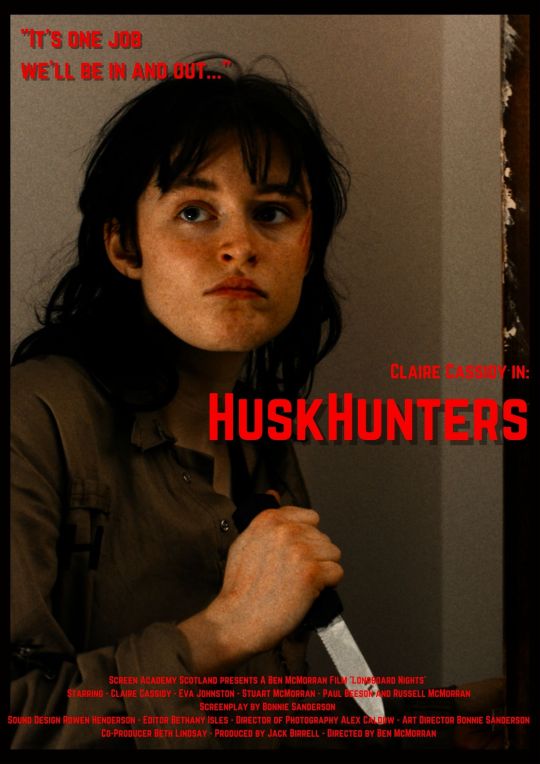
Longboard Nights is a film that, for me, delivers on its premise and although it occasionally loses what Kate would refer to as “Narrative Clarity”, I think the broad strokes (which is the bread and butter of an action film) are affecting and impactful. The moments that work best for me are the entrance to the flat, the bathroom scene and the final moment which I will analyse to show how my work has helped to deliver the film’s story.
As cinematographer, the developing framings of the opening shot of the living room sequence, does what I intended, showing the character's intentions and action in a way that emphasises their importance and psychology. We go from a close up on the door-handle, to a close-up on Alex’s knife, onto a single of Alex and then finally into a two-shot as they creep into the flat. The close-ups communicate the careful entrance and the murderous intent, while the framing of the actors shows their performance clearly: Alex’s grim look, her making sure Casca is silent when closing the door and her then taking the lead into the room. The tracking backwards emphasises the rising action and the creeping of the characters, pairing well with Rowen’s sound design to create a rising anticipation of the coming confrontation. The developing lighting, with Alex stepping into the low-angle toppled light source, also creates a change within the shot, moving us forward from what was a softly lit opening into a high contrast close up ending shot, again emphasising the movement into a more high-intensity scene. The clear communication along with the rising tension sets the scene up well.

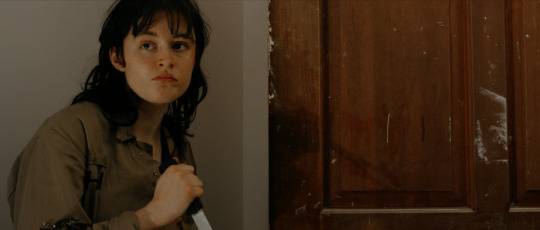
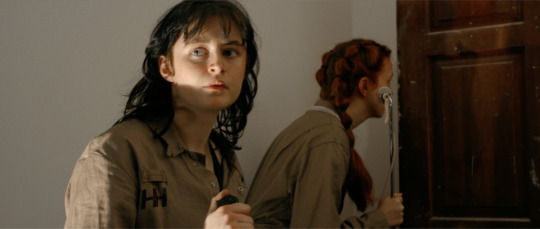
Shot 5.1: Multiple framings as we track backwards as the characters enter the flat.
Where I think the film stumbles slightly is in the moments that are quickly cut in order to not just meet the time restrictions, but also to communicate multiple things quickly. As in the next moment, where Alex is distracted by the photograph of the husk and his daughter and in the opening scene where we set up not just the world and the characters, but also a whole backstory relating to our protagonist. In order to show the differences in time, I designed the flashbacks to be softly lit, in contrast to the rest of the film, shot at a 360 degree shutter angle and played back only showing every third frame. However, in post-production, we decided we needed a clearer visual difference between past and present so added another layer to the shots, where we brought in vertical streaks in the image and an overall glow. While these changes are necessary to contextualise the flashback narrative, when it is combined with the quick cutting and the world-building soundtrack, it becomes a little hard to follow. This aspect of the narrative, Alex’s past with her father’s turning and how it impacts her present actions, seems to be the first thing that can stop people totally engaging with the film. Having shown it to people who did not know anything about the narrative, this was the thing they found confusing. They didn’t understand Alex’s actions, which is really quite a big aspect of the story. The fact these scenes are a little underlit also doesn’t help the confusion. (Another well-thought-out part of Rowen’s work is the shrewd timing of the line “11 years ago” from the politician’s speech which he placed underneath the first flashback, helping to smooth over the gap in communication).

Shot 2.1: The flashback sequence, with post-production alterations.
The bathroom scene and final moment both display another strength I think the film has, which is an excellent central performance from Claire Cassidy, emotively directed by Ben. Despite working with an untrained actor, Ben, through his research into directing and acting techniques, was able to get Claire to the point where she was able to fully cry on screen and totally communicate the intense panic the character is feeling.
Again, I think I made the correct choices in the cinematography in these moments to best add to the emotions captured. The handheld camerawork combined with the wide lens creates a visceral panic and a very ‘present’ feeling, if that means anything.

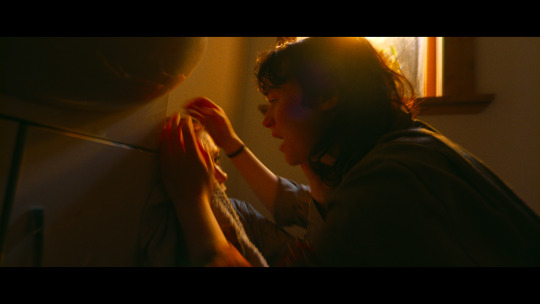
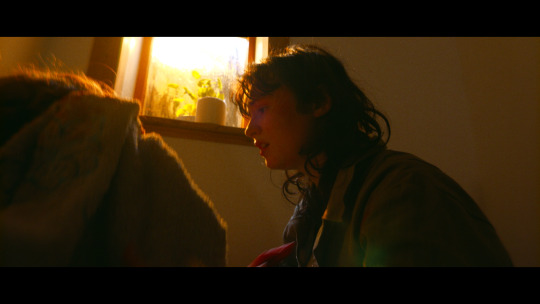
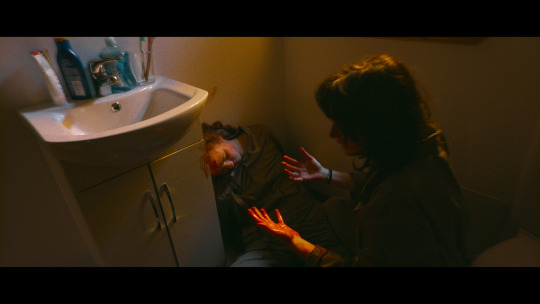
Shot 6.1: Wide angle, handheld shot of the bathroom scene.
Again, I used multiple framings within one shot to emphasise specific narrative beats: Alex’s panic, Casca’s precarious situation, the blood on Alex’s hands, Alex feeling overwhelmed and alone. The long take was both a practical consideration, to ensure we had enough time in the schedule, and also added to the intensity of the content of the scene. The use of the 14mm lens throughout the film was mainly inspired by the films of Terry Gilliam where they are used to emphasise the unsettling nature of his dystopias and the characters within them. In order to ensure I could achieve a similar effect in this film, I also tried to emulate the chromatic aberration of the 14mm lenses used in his film Brazil (1985). I added a “prism blur” effect to the edges of the frame to disrupt the image and make it feel more disgusting and unsettling. I used this effect on all of the 14mm shots throughout the film as I had already saved the lens for the moments when the world was particularly unsettling and the characters were sliding closer to their fate, so the addition of lens aberrations would not be out of place.
While the final shot is a little shaky and quite poorly framed, I think it is also an example of where the cinematography was able to elevate the action on screen. The camera pulls out very slowly as Alex desperately tries to get Casca up on her feet, as if saying: they’re not going fast enough, she’s not going to make it. I asked Bethany if we could repeat the last frame of the film a few times as we cut to black to ensure that the final cut leaves an impact and we keep thinking of the characters through the final moments. This final frame, like the rest of the film, was shot with a 270 degree shutter angle, to create heightened motion blur and I think it really works to emphasise the desperation of the characters’ movements.
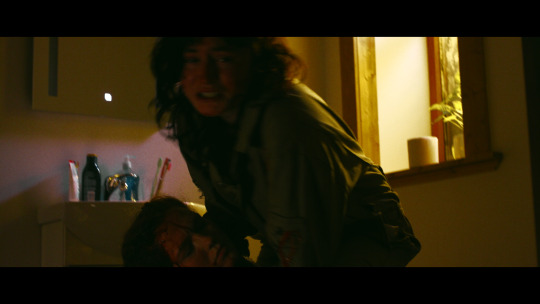
Shot 8.1: The final frame of the film.
Overall, I think the film delivers the emotional impact of the narrative: is tense when needed, is thrilling when needed and is depressing when needed. The art design and SFX is well displayed and elevates the film. Due to its quality, we didn’t need to hide anything in the design of our shots, so the believability of the gore and the action is at a level that ensures the audience are invested and their disbelief is suspended. The sound design is another thing that really helps sell the emotion of the film, with the final announcement over the black screen leaving a really bleak tone to the ending.
As for issues with the film and my work, there are inconsistencies within the film's visuals that, while not breaking the illusion of the film, could definitely be improved. In order for the action to work, the bathroom had to be directly connected to the living room, however, in reality, this was not the case. So, to cheat this, I had a light shine through the door when it was opened, trying to match it to the lighting of the following scene. However, I used a different wattage of bulb to cheat the bathroom from what I used to actually light that scene. Samuel Duner later pointed out that the colour temperature of a tungsten light varies based on the wattage of the bulb, which meant that it was harder to match the colour of the light between scenes. Something I should’ve researched before the shoot.
Another issue comes with the motivation of the majority of the film’s lighting. As the film is set at night and the camera needs to be able to follow the action in quite a wide arc, I chose to light the majority of the interiors by placing lights outside with a combination of gels and blackout material behind them to imply street lighting. However, often there is a bit too much spill from the natural light, no matter how hard we tried to black out the sun. On top of this, the colour temperature I chose can be read as golden hour sunlight, which kind of breaks the world of the film. I tried to push the colours to a more yellowy hue in the colour grade, to little effect. The room was also quite large so there are points in the scene where the action is between my two main light sources and therefore looks flat and underlit. In hindsight, more use of practicals in the living room scenes would have helped to properly light the scene and create the desired time of night.

Shot 5.7: My least favourite shot, complete with both lighting issues and poor framing.
There are other moments where the framing is leaving a bit to be desired, especially the shot showing Alex dragging Casca into the bathroom. Due to the movement, where I was tracking and panning with the action, I was consistently missing parts of the performance. My camera operating needs some improvement and while I did eventually get a technically good shot, the take used was the best one for the story.
Interestingly, one of the main critiques of the cinematography was of the coverage of the hallway scene - the only scene where we cut a shot. We tried to combine two shots (4.2 + 4.3), due to running out of time in the day, but I still missed a section of the action, leaving Bethany not a lot of room in the edit of that scene. I think the original shot list covers what it needs to, in a way that is both practical and emotive, however, I think more inserts of specific actions in the fight scene could have helped to clearly communicate the specific actions.
The use of hard light sources, heavy grain, 2.35:1 aspect ratio, foreground elements and darkly lit interiors all contribute to a grimy and intense overall look that suits the tone of the film and the psychology of the protagonist. I think the inspirations for the look of the film definitely come through as well, most notably, The Batman (2022) and Mandy (2018).
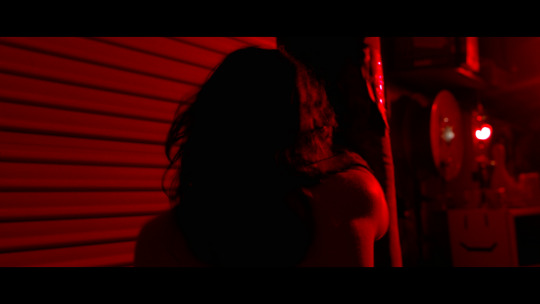
As I’ve touched on, the narrative clarity of Alex’s backstory and its impact on the film’s story is certainly lacking and there are some technical issues throughout the film, but I am still incredibly proud of the film and my work on it. I think the visuals (mostly) communicate the story and create the appropriate tone and emotions. I’m very happy after this term and I think my pre-production and conceptualisation work paid off.
1 note
·
View note
Text
Shoresy
not the promised thing i was working on, but something i couldn’t wait any longer to get off my chest:
Shoresy literally only has found family.
he was in the foster system from, judging based on the pictures, at least eight or nine years of age. specifically, he was placed with the man he calls ‘Dad’ at that age. he could have been in the system since he was born, or tragedy could have placed him there more recently. we just don’t know.
what we do know is that as an adult, Shoresy attends a family reunion as his father’s son, with his siblings, who are also all fostered. Dad Shore at one point even emphasises the fact that the kids were never referred to as siblings in their childhood, which only serves to underscore the fact that they choose to refer to themselves as siblings in adulthood. Dad Shore also points out that Shoresy’s competitive nature drives him, explicitly saying: He only beat Mo once, but he’s been chasing that feeling ever since. This draws a bright line between Shoresy’s hatred of losing and his desire for Validation.
all of this makes a line from the previous episode hit SO DIFFERENT. Shoresy repeatedly reminds his teammates to call their parents, admonishing them with the question: Have yez really not called your parents? D’ya want them to hate yez? He then is shown on the phone himself, while his teammates talk to their families, calling out their bad behaviour as, ‘so dumb.’ We don’t know for sure who he’s on the phone with, but in light of the precipitating conversation, it’s a safe assumption he’s calling a family member, probably his dad. By flagging up his teammates’ laxness, he puts himself in stark contrast; his call is basically a cry of HEY DAD, LOOK WHAT A GOOD SON I AM DAD, ESPECIALLY IN COMPARISON TO THESE TWATS DAD, TELL ME WHAT A GOOD SON I AM DAD.
Shoresy: This is great. I’m going to get a good grade in ‘son’, something that is both normal to want and possible to achieve,
it makes me wonder if Shoresy was formally adopted at all, or if his placement was a long-term foster. the shared last name, Shore, seems to indicate that he was, although it is possible that he changed his name to more visibly align himself with his family.
#shoresy#waffle shore#letterkenny#jared keeso#spoilers#shoresy spoilers#shoresy episode 3#Know Your Role#shoresy episode 4#If You Can't Win Don't Play#meta#original post#my writing
480 notes
·
View notes
Text
Give Us A Laugh, We Miss It
Inspired by this ask here
Word Count: 2,178
Warnings: None
This is a SFW tickle fic, if you don’t like that then don’t read :)
Ranboo's sing-song voice hummed out in the room, “Not gonna get me~”
“How do you not laugh at anythin’?” Tommy demanded, slapping a hand into the armrest of his chair as he turned to look at the masked teen beside him. “We really can’t see you trying not to- ya know-” He pulled a face as if holding his breath and bringing a hand to cover his mouth, emphasising Ranboo’s advantage of the mask hiding his features, only for the teen to throw his hands up in a helpless shrug.
“No- I just haven’t- I legitimately have not laughed,” he replied, his own words tapering off at Tubbo’s mutter of, ”I’m gonna rip it off.” His eyes were impishly glinting, which were the only things seeable in the fabric of his red hoodie that was practically drowning him. The narrowed pair of eyes were locked right on Ranboo’s black and white face covering.
Ranboo leaned away with an unseeable smile of amusement. “Don’t you dare rip it off.”
“I have scissors.”
“Don’t rip it off.”
The threat however, was indeed acted upon later that same night.
When they hit end stream, Ranboo slipped off the glasses and mask with a content sigh, his eyes squinting with his smile at the pair on either side of him.
“That went well I think,” he commented, “can’t believe I’m the one that got you both to lose though.”
“We weren’t expecting you to make a balls joke!” Tommy defended, tapping at his keyboard to send a message to his editors about the vod.
“I didn’t, I was just stating a fact!”
“Bullshit, you knew what you were doing,” Tubbo grumbled, glaring at his phone which was being flooded with Twitter notifications from the tweet he was forced to make from losing the challenge.
Ranboo chuckled quietly, folding his glasses and placing them on the desk alongside the iconic mask, stretching his arms back over his chair. He was unaware of Tubbo staring at him rather intensely.
Tommy however, scoffed loudly. “Oh, so you laugh now that the cameras are off? Such a bastard.”
The faceless streamer gave an offended noise. “What? We’re not doing the challenge anymore! Why wouldn’t I laugh now?”
Tubbo leaned towards him, a devious smirk on his face as a plan formulated in his head. "That’s a good point Ran, we haven’t heard you laugh in so long. I think you owe us some laughter.”
Ranboo gave him an odd look, confusion evident in his face. “Huh?”
Tommy, who had taken part and fallen victim in Tubbo’s schemes before, knew exactly where the boy’s mind was headed, and he turned in his chair slowly, a mischievous grin stretching on his face.
Now, Ranboo was running laps of Tubbo’s house, screaming like Wario as Tommy and Tubbo skidded after him, cackling madly as they tried to cut off the American from escaping.
“Bugger off! Both of you! Just- Tommy, crAP!” Ranboo had to slide on the floorboards with his socked feet to avoid running straight into the blonde, changing course mid-motion to bolt towards the kitchen instead.
Tommy gave a yell of outrage. “Oi! No- Tubbo catch him! Catch him!”
Tubbo absolutely leapt across the space, managing to grab Ranboo around the waist and cling on with surprising strength, planting his heels into the ground and laughing when the boy almost stumbled to the floor. "Got him! I got him, Tom!”
“Hold him there!”
Ranboo dropped an arm to Tubbo’s side, squeezing quickly at the skin and delighting at Tubbo’s squeal of alarm, the boy immediately scrambling away from Ranboo and releasing him. Unfortunately for the tall teen, Tommy had skidded in front of the kitchen doorway, blocking off his one way of escape.
Ranboo yelped and went to run towards the second door that led to the bathroom, only for Tubbo to get his bearings long enough to stretch an arm out, grab his side and squeeze. Ranboo’s knees immediately buckled at the rush of ticklish sparks through his nervous system, an involuntary yell leaping from his throat to accompany it.
With his stumble, Tommy leapt at him and wrapped his arms around his chest from behind, his hands finding the spaces between his ribs and vibrating mercilessly. Ranboo just about leapt out of his skin, a strangled scream of alarm and wild laughter flowing out of him in seconds.
“T-ToHOHohohommy! L-Lehehet goHOHoho!”
“Nice Tom! Don’t let him escape!” Tubbo skidded in front of Ranboo, grinning widely as the tall teen squirmed and tried to rip Tommy’s hands away from his sensitive ribs. “Gotcha Boo boy! Now give us your giggles!”
His own hands reached out and clamped onto Ranboo’s sides once more, squeezing and poking quickly, causing the boy to jolt back further into Tommy who only tightened his grip around Ranboo’s chest. Keeping him locked in place as he was tickled from the front and back.
The boy seemed to realise how screwed he was as he tried to wiggle free as he yelped through his mad giggles; “WhiHIHIhiy?! Whhahat dihihid ihihi dohoho?!”
“You bet us,” replied Tommy simply, “so, you must suffer,”
“Thahat’s noHOHoht aha gohohood reheheason.”
“Fuck you, it’s our reason,” Tubbo snorted, shifting his hands up and down Ranboo’s sides in a random pattern to keep him guessing.
“He owes us at least fifty minutes worth of laughter, you know,” Tommy spoke up, wriggling his fingers into the grooves and prodding along the bones as he talked. “That’s how long the stream was.”
“You sure it wasn’t closer to an hour? May as well round it up,” Tubbo shrugged, “dickhead probably deserves it anyway.”
“Yeah you’re right, wanna go for his hips? Think they’re a good spot.”
“Yeah sure, attack his armpits while we’re at it, they’re a bit sensitive.”
“Oh yeah, good shout man.”
“G-GUHUhuhuhuys! St-StohoHOp ihihihit-! Ohoho mihihiy gohohod!”
“Awwww, there we go! Laugh it up, boss man!” Tubbo snickered, drilling into Ranboo’s hips and making his voice jump up an octave as he shrieked.
“NOHOT THehehere! TuhuhuHUBBO plehEHease- TOHOHOM!”
Tommy snickered close to his ear, his hands having left Ranboo’s ribs alone to instead target his underarms, which in Ranboo’s humble opinion, was so much fucking worse-
“TOHOHOM! PLEHEHEASE- TUBBO- GUHUHUYS CUHUT IHIT OHOHOUT!”
“Oh hey, look at that, you were right,” Tommy chuckled, “armpits were a good idea.”
“Hips got us some good reactions too, nice thinking Tommy.”
“I always aim to please, my friend.”
“We appreciate your service.”
Ranboo groaned in annoyance through his laughter, rolling his eyes as he pressed out his words through his hysteric cackling. “STOHOHOP TAHAHALKING LIHIHIKE THAHAT!”
Tommy only scribbled more into Ranboo’s underarms, causing the teen to throw his head back with a strangled squeal. “Oh hush up Ranboo, we’re trying to have a civil conversation,” he reprimanded like a disappointed parent.
Ranboo went to reply through his tumbling giggles, just for a sound just sort of scream to rip from him as Tubbo pinched quickly at his hip bones.
“Awww, he’s laughing up a real storm,” he cooed, his nails having shifted to Ranboo’s lower back, scoping out the sweet spots in seconds and moving his hands with the taller boy’s frantic squirming, not leaving him any room for relief. “So we agree he definitely lost the challenge right?”
“Oh yeah, by a long shot,” Tommy agreed with a nod, tapping his fingers against the sensitive skin quickly before scratching along the sides of the pits, the method making Ranboo try to fold in on himself and stomp the floor, his laughter turning squeaky and high pitched in his mirth.
His legs were shaking as he tried to stay upright, though the tickling was weakening him quickly and making Ranboo want to fall to the ground. Tommy had a good grip on him though, so he was fairly certain he’d still be stuck with these monsters even if he tried to escape via the floor. Suddenly Tubbo perked up, eyes alight with something Ranboo did not trust at all.
“Ooo, tell you what- Tommy, stop with his armpits for a second, I have an idea.”
Tommy re-adjusted himself to hold Ranboo around his chest more securely, Ranboo’s arms overhanging the hug-like hold like a cat that had gotten picked up. Tubbo grinned up at Ranboo who only shrunk away in fits of tumbling, nervous giggles.
“T-Tubs- I-I knohow whahat yohou’re thihinking,” he pressed out between gasps, leaning into Tommy who was watching curiously.
“Oh yeah? And what am I thinking, Boo?” Tubbo asked innocently, his hands flexing and wiggling closer and closer to Ranboo’s hoodie clad stomach.
“D-Dohohon’t- dohohon’t-” Ranboo spluttered, squirming in place though his height did nothing to help him. Tommy was holding on tight, and the silliness of the situation was making him lose strength.
“Don’t what, Boss Man?” Tubbo cooed, cocking his head to the side slowly and grinning like the Cheshire Cat. “Tickle you, perhaps?”
His hands slipped under Ranboo’s hoodie in a fast lunge, his nails scribbling against the soft skin in a well practised attack. A howl of laughter tore from Ranboo, his whole body jolting as hysteric cackles burst free, trying to leap away only to crash straight into Tommy’s chest, and the blonde was not letting go.
“Holy shit!” Tommy exclaimed gleefully, watching as Ranboo kicked his foot against the floor and shook his head frantically in laughter. “That’s gotta be his death spot.”
“Oh yeah,” Tubbo snickered. “He really can’t stand it, especially when I do this.” His fingers then targeted Ranboo’s waistline and lower belly, scratching quickly at the skin and not leaving a single ticklish stone unturned.
That was too much for the tall teen and his legs finally gave in, dropping his weight and making Tommy yelp in alarm as he was left to hold Ranboo as dead weight. Tubbo cackled at the sight before him and only went back in for seconds, pinching at the same spot quickly.
Ranboo, who was halfway to the floor, had his torso stretched out for Tubbo’s merciless attack to fall victim to. He threw his head back with a squeal, the heels of his feet weakly scuffing the floorboards as he tried to right himself but ultimately was stuck as his limbs refused to cooperate.
His words were lost in his wild laughter, leaning entirely into Tommy who was struggling to keep him upright, though he was grinning at Ranboo’s hysterical giggling. “And to think you were doing so well during the stream,” Tommy tutted. “What happened Ran? You were great at not laughing.”
“T-Tohohom shuhuhut uhup-” Ranboo squeaked out, his face a warm shade of pink and eyes squinting with how wide his smile was. Tommy couldn’t help but let out an adoring coo at the sight, prodding a little at Ranboo’s ribs from where his arms were wrapped around his chest to see him flinch and snort in laughter.
The tickling lasted a minute more before Tubbo pulled his fingers away, Ranboo slumping further to the ground in relief and Tommy had to set him down on the floor before he toppled down right along with him.
“J-Jesus- jesus christ,” Ranboo wheezed, his arms wrapping protectively over his midsection and giggle filled pants leaving him in spurts.
Tubbo snickered, crouching down in front of him and snagging a water bottle from the desk close by, offering it to the tired American. “Sorry for that bud. You kinda deserved it though.”
“How?!” Ranboo stared in disbelief, taking the offering and spinning the cap off. “All I did was complete the challenge!”
“Yeah that’s the point,” Tommy’s hand suddenly dropped into his hair, gently messing with it to help Ranboo calm down. “You made us lose and tweet stuff against our will, so, ya know, kinda had to get you back for that.”
“You guys are unbelievable. Can’t believe I want to move here.”
“Yep! You’re stuck with us!” Tubbo grinned, gently kicking his foot into Ranboo’s leg. “And if you dare try to leave the UK, we’ll simply hunt you down and make you come back. We’ll kidnap you!”
“We do know where you live after all,” Tommy grinned, plopping down on Ranboo’s other side and slinging an arm around his shoulders. “So take this as a threat.”
Ranboo dropped his head into his hand to hide his grin, groaning a bit in exasperation for the bit. “What did I do to deserve this?”
“You became friends with us!” Tubbo was suddenly right beside him and bopped his head against his shoulder. “And you don’t regret it at all.”
Ranboo hummed in the back of his throat in a joking disagreement. “Well…” He sighed.
Tubbo’s easy smile dropped into a death stare in milliseconds, the look sending a chill down Ranboo’s spine. His next words were haunting. “Tommy hold him down again.”
“WAIT HANG ON-”
Tommy yanked Ranboo down with the arm wrapped around him, pinning him to the floor and laughing at Ranboo’s panicked yells as he and Tubbo loomed over the lanky teen.
“GUYS! NONONONO- NOHOHOHOT AGAHAHAIN!”
#my fanfic#lee!ranboo#ler!tommy#ler!tubbo#bench trio#ranboo#tubbo underscore#tommyinnit#dsmp#dsmp tickle#mcyt tickle
269 notes
·
View notes